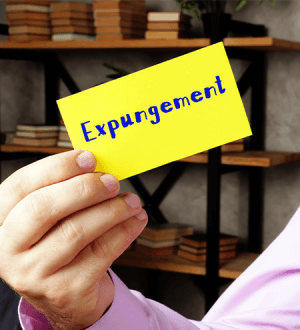Port Charlotte Expungement and Sealing Lawyer
Expungements and Sealing Attorneys in Port Charlotte, FL
Living with a criminal record can present countless burdens and challenges on an individual, and it’s only natural that someone who’s “served their time” would want to move on with their life. While there are options available for some people to clear their records, this can be a confusing process.
According to research done by the National Institute of Justice, even if expungement or record sealing is available to those who’ve previously been accused of a crime, the majority of people aren’t able to take full advantage of this process without legal help. The study found that 90% of individuals who had full-scope legal representation were able to eventually clear their criminal record completely compared with only 13% who achieved this and were in a “self-help” group.

If you’re interested in sitting down with a criminal defense attorney in the Fort Myers, Sarasota, or Port Charlotte, Florida area, contact Ruhl Law, P.A., today to schedule a consultation. An attorney has the knowledge, experience, and resources to assess your situation and cater to your needs.
What is Expungement?
To “expunge” something means to erase it, so in this sense, if you expunge your criminal record you’re essentially erasing it like it never existed. Also, Florida uses the term “expunction,” but the two can be used interchangeably and have similar meanings. Once this process is completed, your criminal record will not be viewable to the public or to certain government agencies, such as the police department or the courts.
Not everyone or every crime will be eligible for expungement, and Florida sets out its own guidelines for this.
Who Is Eligible for an Expungement?
- Your charges were dismissed, you were acquitted, or there was no indictment.
- You were not sentenced to any kind of supervision, such as probation for the crime you’ve been accused of.
Who Is NOT Eligible?
- If you’ve previously had a record expunged, you are not eligible to do it again (though, there may be a statute of limitations on this that will allow you to expunge a second offense if the previous expungement was over ten years ago).
- If you have a prior conviction that isn’t eligible for expungement.
- If you have a prior adjudication of delinquency for certain misdemeanors or any felony.
Having your record expunged comes with several benefits, including:
- You legally do not have to disclose your criminal history when applying for work or housing.
- It expands your options for getting a job or finding a place to live because a background check will no longer turn up a criminal record.
- Peace of mind knowing that your past is the past and will no longer influence your future.
- Can restore civil rights like owning a firearm or voting.
- Can increase opportunities to volunteer and help your community.
The first step you need to take if you’re interested in expungement is to contact an attorney who can help you. You will then have to obtain a certificate of eligibility from the Florida Department of Law Enforcement (FDLE), and then file this along with a petition to the courts. You will also have to send this to the State Attorney’s Office.
What Is Record Sealing?
Record sealing is often confused with expungement, and though the two processes are very similar and can bring many of the same benefits, they differ in one key way. When you have your record sealed, it is no longer accessible to the public, but it will still be accessible to government agencies. To be eligible for record sealing in Florida, you must meet the following criteria:
- Haven’t had a record sealed or expunged before.
- You’ve completed any court-ordered supervision for the alleged crime.
- The crime in question is an eligible offense.
- You have no other no adjudication or conviction that would disqualify you.
- You were not found guilty of the crime.
Because sealed records are still visible to some government agencies, this means that your record still technically exists, even though no one in the public can see it. However, there are certain scenarios when your record would still be consulted. For instance, if you’re applying for a job in a school or to work in law enforcement, your record will likely be reviewed.
The process for sealing a record is similar to that for expungement, and likewise, it’s always in your best interest to work with a reputable lawyer.
Knowledgeable Legal Assistance
Even though the process may seem simple to request expungement or record sealing, the potential benefits (and drawbacks if it fails) are far too great to try on your own. When you work with an experienced attorney, you’ll be bringing on a trusted partner who can evaluate your case, advise you on your next steps, and advocate on your behalf.

Expungements and Sealing Attorneys Serving Port Charlotte, Florida
If you’d like to learn more about your options for getting your criminal record expunged or officially sealed but aren’t sure where to start, contact Ruhl Law, P.A., in Port Charlotte, Florida, for strong and dependable legal guidance.
Trusted Legal Assistance
Tell us about your case and discover what we can do for you.
© 2026 Ruhl Law, P.A. • All Rights Reserved.


